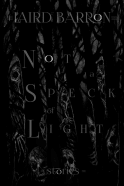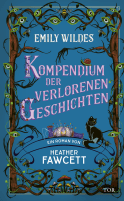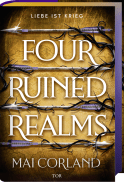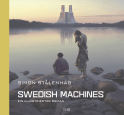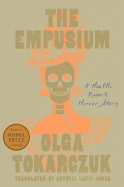
Otherland Book Recommendations August 2025: Horror
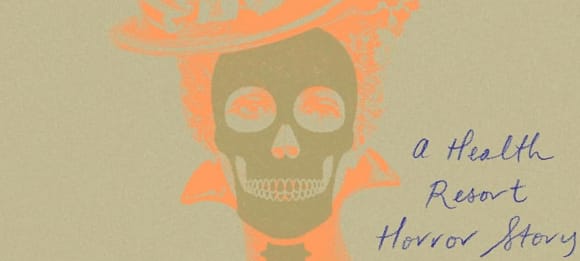
Otherland, 21.08.2025
Here we have new book recommendations from the Otherland Bookshop Berlin. With an English book market so much bigger than the German, not every book can be translated. This article is for those of you who also read in English.
Olga Tokarczuk | The Empusium
Penguin Putnam Inc: €22
I got into Olga Tokarczuk thanks to a glowing recommendation from one of our customers, who described her as hands down one of the most interesting writers of our time. Big claim.
I found a copy of Drive Your Plow over the Bones of the Dead and got stuck in. The book is about a string of bizarre murders on a hunting estate on the Czech-Polish border. Our protagonist – sort of an unofficial caretaker for the area’s summerhouses – is convinced that the murderers are actually animals getting their revenge for their hunted kin. I was really impressed. Poetry, philosophy, tension, horror, and some very dark humour, too. I was now an Olga Tokarczuk fan. (I should say, she won the Nobel Prize for Literature, so I am clearly not the only fan.)
Luckily for me Tokarczuk has a newly translated book out this year: The Empusium. The new story follows young polish engineering student Mieczyslaw Wojnicz as he travels to the spa town of Görbersdorf (present-day Sokolowsko) seeking treatment. He is looking to get into the local Kurhaus, but instead he finds himself stuck in the half-way Gästehaus für Herren run by the eccentric Wilhelm Opitz. The other guests (all men) are… interesting. Together they spend the time discussing everything from atavism, to evolution, to witchcraft. Does man have a soul? Is socialism the way forward? Should women be allowed to vote? All well and good, but to treat his apathy, paranoia, tuberculosis, consumption, and general fear of nakedness, young Mieczyslaw really needs a place at the big house. Unfortunately, places are in high demand. It seems you only get in if someone dies, and in Görbersdorf no one dies. (They don’t even have a graveyard.) A healthy climate or wishful thinking? Mieczyslaw soon learns that people have in fact been disappearing in the woods around the village for years – their bodies ripped to shreds by some unknown person, or thing…
Tokarczuk’s novel takes a modern feminist reading of Thomas Mann’s Der Zauberberg and weaves in her uncanny humour and philosophical wanderings. Meticulously researched and boldly told, the tale has a really peculiar style: a focus on the most minute details combined with a constant disruption of the reader’s perspective, as if the whole thing is a set of director’s notes on stage design and camera angles. Elements of the plot send you on weird tangents, like the Kurhaus itself, which is reminiscent of Kafka’s castle, an almost supernaturally unattainable goal which the protagonist can’t seem to crack. Combined with the cast of larger-than-life fellow patients and the ever-present Gothic script, the whole thing has the feel of a nineteenth-century play. And the absolute annihilation of early (and, sadly, modern) chauvinist thought is a joy.
Translated by Antonia Lloyd-Jones.
[Tom]
Laird Barron | Not a Speck of Light
Bad Hand Books: €23,5
He's back from the darkness to tell us all about it in his new book, huzza!
Finally, a new short story collection by Laird Barron – a collection jumping from the depths of abysses right into this year’s Bram Stoker final ballot, so you just know it has to be good, right? RIGHT!
Divided into four, partly interconnected, thematic blocks each consisting of four short stories, Not A Speck of Light features 16 stories as dark as the title implies, but also as kooky and strange as long-time readers will be familiar with. By kooky and strange I mean Edgar Allan Poe in puppet form, a recreated fake-town of Lovecraft's Innsmouth, aliens, dogs with souls, black magic, in addition to the recurring usual suspects, Jessica Mace, the Tooms' or Black Dog Security.
And yes, even in the most fantastic collections there will be personal highlights and lowlights, so here are my personal best of's;
‘The Blood In My Mouth’ follows a very intense kind of character and his relation to the love of his life. Even though the characters aren’t necessarily modelled to be relatable, they’re very personable to people of a certain age who were lucky to live through the heydays of The Cure and The Pixies, and the way Barron writes them, in a weird way, has such an "Americana" character, as all of his work does, but this one felt very authentic to me in that way, and I enjoy that.
‘Nemesis’ is about Larry, who sits in a room after a long walk, or in a Star Chamber (not sure which, maybe both at the same time), alternately, and tells how his father killed him, or just took out one of his eyes, but there are many versions to his story and it seems none of them are definite.
‘Soul of Me’ is a quite touching account of various incarnations of a dog, Rex, the German Shepherd. This book generally reflects Barron's affection for dogs, and this story specifically really goes deep, emotionally.
The titular novelette, ‘Not A Speck of Light’, gives the final blow, fantastic piece of writing about love for dogs, black magic, creepy neighbours, and the darkness from which one returns. I guess it’s safe to say it’s my favourite of the collection.
So, all this and more is awaiting you, if you don't want to miss the short story collection of the year (yes, I’m still salty he didn’t receive the Bram Stoker for best collection), grab it immediately, dive into that black.
[Inci]
Stephen Graham Jones | Buffalo Hunter Hunter
Titan Books: €28
In the age of never-ending reinvention of the vampire trope (and frankly, of every other trope too), it is pretty damn hard to create something original, and more importantly, something meaningful out of this rusted, crusted, dusted motif.
One way of achieving such originality is by putting the vampire in all sorts of unconventional, unexpected, surprising, sometimes even silly or compromising situations, which, if we're being honest, isn't all that original anymore.
Another way is to dive into the heart of what vampires are about, and use or maybe modify that foundation in order to suit your story and to make your point. Horror author Stephen Graham Jones makes exactly that in his latest novel, The Buffalo Hunter Hunter, and to make a meaningful point, as is well known, is his strong suit.
The Buffalo Hunter Hunter is the nested narrative of present-day academic Etsy Beaucarne who wants to write a book about the 1912 diary of her great-great-great-grandfather Arthur after it was recovered from the remains of a wall during some renovations. In his journal, the Lutheran priest tells the story of an indigenous man turned vampire looking for justice for a massacre committed against his community, in which 217 Blackfeet died. So, the story works on three levels which throughout the course of the book gradually find to each other, and blends the historical into the horror, while the line between these two remains blurred, as it is usually the case when Jones writes about Blackfoot people, now or in the past.
“This, I believe, is the story of America, told in a forgotten church, in the hinterlands, with a choir of the dead mutely listening.”
The Blackfoot named Good Stab first shows up to pastor Arthur Beaucarne's Sunday speeches, and in time he makes it clear that it's actually a confessional that he wants. The pastor accepts, and that is the point where the real story, and the fun begins. This peculiar Indian who wears darkened spectacles in church has had a close encounter with what he calls "Cat Man" and it transformed his life in ways he never would have thought. Being an immortal, rather beastly, wild kind of vampire, and needing to drink blood to survive, he shifts his shape according to the being whose blood he drinks. Thus, he is in a constant state of dilemma of wanting to still belong to his community, but needing to consume them in order to stay one of them - and that's only one of his struggles.
As in each and every one of Jones' novels, the climax in The Buffalo Hunter Hunter too is a breathtaking one: there is a reason why Good Stab chose to confess to Beaucarne and the showdown is crushing. The path leading there meanders through constant clashes, debates, and conversations of two characters who couldn't be any more different, but still pull this confession through. What they have in common is that they are both unique characters and have a sense of humour. That humour keeps on resurfacing throughout the whole book, and even briefly takes grotesque dimensions when we move forward in time, from the 1910's to 2012, when we find out what genius strike Good Stab plays on Beaucarne.
Which brings me, again, to the interesting division of the story, something SGJ does a lot - the number three, the trinity seems to play an interesting role here. Both Good Stab's and Beaucarne's lives can be seen in three stages, their lives before the massacre, the massacre which transforms both their lives and the aftermath. While Beaucarne ends a man of faith, Good Stab is taken by dark forces, placing them on opposite sides of one scale. And yet, nothing is as it seems. While, from the very beginning of the book, Beaucarne shows a distinct weakness for worldly pleasures, is a glutton, and that gluttony is an attribute which can easily be extended to his "tribe", colonialists, Good Stab, in his heart, does the right thing, since revenge is arguably the noblest of causes. His story is one of pain, he is haunted, he is the Byronic, tormented main character we've been waiting for (and he wore sunglasses back in 1912!).
Well, what else can I say? A bona fide fan of SGJ now and always, even I am surprised how each new book he writes is better than his last one, and this one indeed one ups all that came before. If you see cover blurbs saying this is his masterpiece, believe it. The Buffalo Hunter Hunter isn't only his best (I’m still leaving a tiny space there since I’m on the fence whether The Only Good Indian comes first or this) yet, I think it is also a good starting point if you don't know the author, but want to try reading him, as the historical aspects, the many massacres and the vampire story make for a speedy pace. And it’s a no-brainer if you already
know his work. As they say, if you're going to read only one horror book this year, make it this one.
[Inci]
Piper Hailey | The Worm and his Kings
Off Limits Press: €17.5
“This is a good place for people to disappear.”
New York. 1990. Falling off the ladder of societal safety has never been easier. For Monique and her girlfriend Donna, lost jobs lead to lost apartments and lost ways. Then Donna vanishes from the homeless community, and Monique finds herself without food or friends, scouring the city for her lover. She is not the only one. A pale reptilian fiend is stalking the backstreets. With sickle-clawed feet and a 10-foot build, “Grey Hill” has been snatching up homeless victims and dragging them down to the city’s underbelly. Down to... something. Down past the squatters and the subway tunnels, down through abandoned buildings and cracks in the sewage lines, a new society is gathering. Now Monique is certain that Donna was taken, not killed, and she is determined to bring her back.
I’m still working my way through the suggestions from Sadie Hartmann’s 101 Horror Books to Read Before You’re Murdered, and I’m currently on the cosmic horror chapter. Other chapter entries include LaValle’s Ballad of Black Tom (insert love heart) and Langan’s Fisherman (insert fish), so it is a pretty classy selection to find yourself in. Hailey Piper’s 2020 novella is a good fit: a must for anyone keen on the alternative, indie publishing side of modern horror, and it has an emotional punch alongside the expected creepy cult vibes and the monster-of-the-week creature features. Much like in Black Tom, the traditional cosmic horror elements are repurposed for a new community here. As well as shining a light on the failures of America’s (absent) social protection system, Piper puts a LGBTQIA+ spin on the Other, and comes up with a refreshingly new take on self-love, damage and personal identity. And at 114 pages you could read this in a day, there and back on your U-Bahn commute. Just don’t fall through the gaps.
[Tom]
